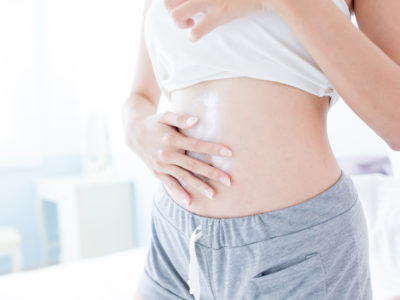Table of Contents[Hide][Show]
“Eat more fiber.”
If you’ve ever experienced digestive issues—and who hasn’t—you’ve probably heard that bit of age-old wisdom.
And while it’s mostly good advice, there’s a potential pitfall.
Too much fiber can be just as bad for you as not enough fiber!
Bloating…constipation…stomach pains…
These are the very things that fiber should help with, but too much fiber can actually make them worse.
But what exactly is “too much” when it comes to fiber? And how can you tell if you’re eating too much of this essential nutrient?
Let’s look at what fiber can do for your health—good or bad—and your best choices for healthy, fiber-rich foods.
What Is Fiber?
Fiber, also known as roughage, is a carbohydrate—mostly found in plants—that your body can’t digest.
While other parts of food, such as protein, other carbohydrates, and fat, are broken down and absorbed, fiber passes through your digestive system relatively intact.
There are 2 types of fiber.
- Soluble fiber dissolves in water. It can help lower your cholesterol and glucose levels.
- Insoluble fiber doesn’t dissolve in water. It can help food move through your digestive system.
To get the best results, your diet should contain both kinds of fiber.
But how much fiber should you have in your diet?
And how much fiber is too much?
According to the USDA, this is how much fiber you should be getting in your diet according to gender and age.
- Women up to age 50: 25 grams of fiber per day
- Men up to age 50: 38 grams of fiber per day
- Women over 50: 21 grams of fiber per day
- Men over 50: 30 grams of fiber per day
Now you know how much fiber you need—but why do you need fiber? Let’s look at the positive impact that fiber can have on your health.
Why You Need Fiber
Fiber is an essential part of a healthy diet.
It plays an important role in keeping your body, especially your digestive system, functioning as it should.
Supports Digestion
Fiber helps your digestive health by promoting regular bowel movements.
If you suffer from constipation, fiber can make stools larger and softer. This, in turn, makes them easier to pass.
On the other hand, if you frequently have loose stools, fiber absorbs water and makes them more solid. This also makes them easier to pass.
Lowers Cholesterol
Soluble fiber can help lower your cholesterol level.
Once it enters your intestine and mixes with liquids, it becomes a thick, gel-like substance that “traps” fat, so that your body can’t absorb it as easily, lowering your LDL (bad cholesterol) level.
Promotes Gut Health
Your gut microbiome is populated by colonies of beneficial and pathogenic bacteria. Because of the limited space, when one type of bacteria flourishes, the other struggles.
Ideally, the colonies of beneficial bacteria thrive and crowd out the pathogenic bacteria.
And fiber helps to make that happen.
Fiber serves as fuel for beneficial bacteria (aka prebiotics), feeding the colonies so that they can grow and strengthen. This diminishes the colonies of pathogenic bacteria, balancing your gut microbiome and supporting a healthy gut.
Helps Manage Weight
Eating a high-fiber diet can help control your weight, too.
Eating fiber can produce a feeling of fullness, decreasing your appetite and leading you to eat less.
Plus, since most fiber comes from plants, it usually has lower calories, sugar, and fat than many other foods. Reaching for healthy, fiber-rich foods instead of over-processed meals or sugary snacks can help you maintain a healthy weight.
5 Signs You’re Eating Too Much Fiber
With all those benefits, you might be tempted to load up on fiber at every meal.
Those on a plant-based diet may also consume more fiber, due to swapping in additional fruits and veggies for animal-based products.
But beware!
If you consume more fiber than the USRDA, you might be doing your body more harm than good, and start experiencing some negative side effects.
Let’s look at some of the signs that you have too much fiber in your diet.
1. Bloating and Gas
Eating too much fiber can also cause GI discomfort such as bloating and gas.
As we mentioned earlier, fiber can act as a prebiotic, fueling the beneficial bacteria that keep your gut microbiome healthy and balanced.
In fact, fiber is often recommended to help reduce bloating and gas.
But if you eat too much fiber—or the wrong kind of fiber—the opposite can happen. Your gut bacteria will still break it down, but it will produce gas as a side effect, which also causes that bloated feeling.
Related
Why Am I Bloated After Eating?
If you’ve been wondering “Why am I bloated after eating,” then keep reading. In this post, we uncover the causes of bloating, including the biggest culprit, dysbiosis, and what you can do to get rid of bloating and find relief.
2. Bowel Issues
Can too much fiber cause diarrhea? Or constipation?
Surprisingly enough, the answer to both of these questions is yes.
Although the proper amount and type of fiber can help regulate your bowel movements, too much fiber can disrupt them.
Fiber attracts water in your digestive system. If you don’t have enough liquids in your GI tract, this can harden stools, which leads to constipation. This occurs most often with soluble fiber.
On the other hand, insoluble fiber, which is good for constipation, can cause loose stools or diarrhea if you consume too much of it.
3. Dehydration
As we mentioned earlier, fiber attracts water, drawing it from other parts of your body and into your GI tract.
This can leave you dehydrated, especially if you aren’t drinking enough water.
4. Nutrient Deficiencies
Too much fiber can also cause you to be deficient in other nutrients.
Fiber acts as a binding agent. It can attach to nutrients and carry them through your digestive tract, causing them to be eliminated before your body has a chance to absorb them.
More specifically, fiber can significantly affect the absorption of nutrients such as calcium, chromium, copper, iron, and zinc.
And, the feeling of post-fiber fullness that can help with weight loss can also cause a nutrient deficiency. If you’re mostly filling up on fiber-rich foods, you may not be getting enough balance in the rest of your diet.
5. Stomach Cramps
Too much fiber can slow down your digestive process, which causes stomach cramps and abdominal pain.
The Best Types of Fiber
As much as you want to monitor how much fiber you eat, it’s also important to eat the right kind of fiber.
This means avoiding pre-packaged products such as fiber bars, which can be high in sugar and other unnecessary ingredients.
Instead, try to get your fiber from healthy foods such as:
- Fruits
- Vegetables
- Whole-grain products (minimally, prioritize other sources first)
- Nuts and seeds
- Beans, peas, and legumes
The less processed or refined the food, the better.
Here are some of the healthiest options for adding fiber to your diet.
Fruit
- Raspberries
- Pears
- Apples, with the skin
- Bananas
- Oranges
- Strawberries
Even better, pick your favorites from this list and make a delicious, gut-healthy smoothie!
Vegetables
- Green peas (boiled)
- Broccoli (boiled)
- Turnip greens (boiled)
- Brussels sprouts (boiled)
- Baked potato, with the skin
- Sweet corn (boiled)
- Cauliflower (raw)
- Carrots (raw)
Adding a scoop of fiber-filled veggies to your plate is a great way to get natural fiber.
Grains
- Whole wheat spaghetti
- Barley (cooked)
- Bran flakes
- Quinoa
- Oat bran muffin
- Instant oatmeal
- Air-popped popcorn
- Brown rice
- Whole-wheat bread
- Rye bread
Legumes, Nuts, and Seeds
- Split peas (boiled)
- Lentils (boiled)
- Black beans (boiled)
- Chia seeds
- Almonds
- Pistachios
- Sunflower kernels
Nuts and seeds can be high in fat, so keep an eye on the label. And, try to pick plain or raw versions, instead of salted.
Prebiotic Supplement
It can be challenging to eat enough of the right fibers.
For example, oranges are a great, healthy, natural source of fiber. Orange juice, on the other hand, can have too much sugar and not enough fiber, especially if you choose pulp-free.
And refined grains, which have been finely milled for texture and consistency, have most of the fiber removed during the milling process, so they aren’t a strong source of fiber, and can create other problems in the body as already mentioned.
To make sure you’re getting enough of the good fiber you need, you can take a prebiotic supplement such as our favorite: Just Thrive PREbiotic.
Each capsule contains three unique “smart” fibers that have been clinically proven to feed only the good bacteria in your gut microbiome.
This supplement can give you many of the same benefits as you would get from fiber, with the added relief that you’re eating the right fiber. Just Thrive PREbiotic helps to:
- support regular bowel movements
- feed beneficial bacteria to encourage gut health
- reduce occasional bloating, gas, and stomach pain
- promote nutrient absorption (a challenge if you’re eating too much fiber)
It’s also available in a powder form that you can mix into your smoothie, tea, water, or even your favorite recipes with the same great benefits.
Final Thoughts
Fiber is a necessary part of a healthy diet.
But can you eat too much fiber?
Absolutely! As with any nutrient, it’s important not to overdo it.
Eat within a balanced range, and choose fiber-rich foods and supplements that will support your health.
You May Also Like…





